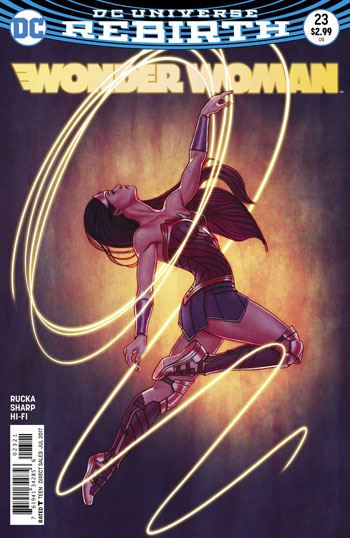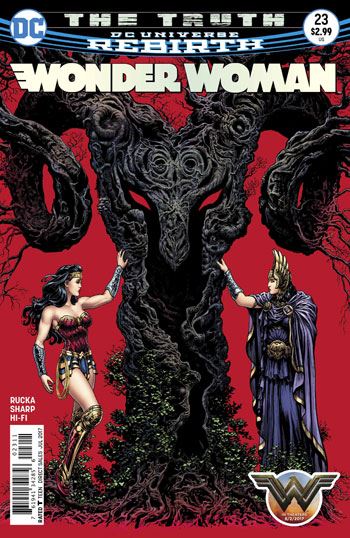Wonder Woman #23
By Hervé St-Louis
May 26, 2017 - 10:56
DC Comics
Writer(s): Greg Rucka
Artist(s): Liam SHarp
Colourist(s): Hi-Fi
Letterer(s): Jody Wynne
Cover Artist(s): Laura Martin, Jenny Frison
$2.99
 |
While I was entertained with this story, the conclusion of this storyline was weak in some places and concluded what was so far one of the best epic featuring Wonder Woman. I like that Phobos and Deimos were not working for their father Ares but masquerading as him in an attempt to trick Diana and the Amazons from revealing the location of Themyscira. But at the same time, I dislike that Ares is no longer the big bad villain that he has been since George Pérez rebooted Wonder Woman in 1986.
It feels like Greg Rucka has neutered a great villain. I dislike this thing in comics where villains are often not really evil and bad. If Ares is neutered, does this mean that he really has no effect on war and how men fight one another? Does it mean that we actually are totally responsible for own acts and warlike tendencies and that Ares is just another boogeyman like the Devil? As a revelation, in the context of Wonder Woman, this means that people are responsible for their acts at all times. I’m okay with this but it brings up another set of questions about Wonder Woman.
If Ares’s influence on humanity is null, then that means that the influence of the other Greek gods is probably also null and that the whole mission of the Amazons as champions of peace and examples to humanity is nil. The whole premise of Wonder Woman as an ambassador and an example to what humanity can attain is really a fake mission and not a genuine objective for the character. The fact, as now established by Rucka that the Amazons don’t even live on Earth or in our dimension reinforces this.
I really liked this story but I feel that Rucka’s reboot is very sweeping and while integrating aspects of Wonder Woman’s past, it does away with a lot of great work and assumptions we as readers have always had about the character. Is this what DC Comics wants us the feel about Wonder Woman? Is this now a character whose legacy is not really one of a mission in man’s world but one that she ultimately decides for herself?
 |
I feel with this issue that he has robbed Wonder Woman of her truth with something that will definitely be retconned in a few years. I should not write retcon. It is Rucka’s Wonder Woman who is a retcon escaping from the truth that has always pervaded the character. I am afraid that DC Comics, specifically, Rucka’s editors have neither grasped how the writer has fundamentally changed Wonder Woman and failed to perceive how this would affect the character. If the next writer is just like Rucka, she will play with the new toys and the new reality of the character but will continue to misinterpret her. Wonder Woman has become a parody of truth.
Liam Sharp has had to work with a script that is visually interesting but ultimately weak. He portrays Wonder Woman’s decent and use of love as best as he can but because the script handed to him by Rucka is not faithful to the character, Wonder Woman looks like a hypocrite when she uses love to defeat Phobos and Deimos. How can the character just love and defeat evil so simply? That her lasso also indicated that she was loving the villains is worse. Sharp did his best but I was not convinced with Diana Prince’s expressions. But I blame Rucka ultimately for this. Sharp was a strong illustrator this issue but his contribution was not sufficient to make this a great comic.
At first glance, it appears that this comic and this storyline were great. I urge you to reread this issue and really ask yourself if truth was well represented and if Wonder Woman was not forced to solve the problems hypocritically. Sure the scene where she meets her mother Queen Hippolyta for the last time is great. So are the parallels with Dr. Veronica Cale losing her daughter a second time. But these are just drapes over the frail script and story concluded in this issue and a weak place to start the next 75 years of Wonder Woman.
Rating: 5/10
Related Articles:
Dawn of Justice DC Multiverse Wonder Woman
Wonder Woman 1984
Wonder Woman film review
Wonder Woman #34
Wonder Woman #33
Review: Wonder Woman Conan #6
Wonder Woman #32
Wonder Woman #31
Review: Wonder Woman Conan #5
Review: Wonder Woman Conan #4
